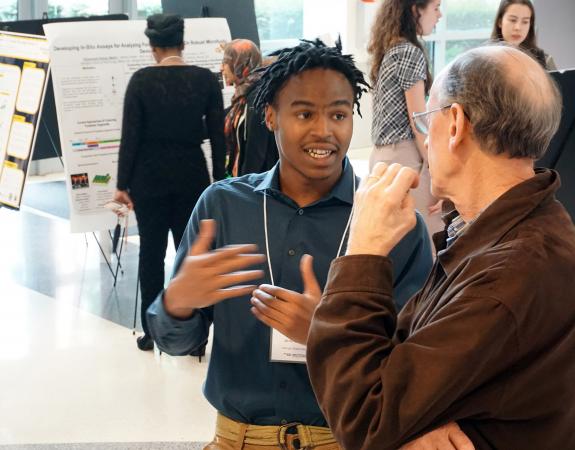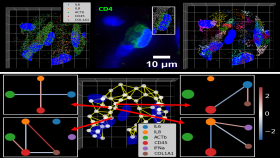A 21st class of Petit Undergraduate Research Scholars has been selected. These 14 scholars will immerse themselves into the multidisciplinary pool of research at the Petit Institute for Bioengineering and Bioscience at the Georgia Institute of Technology in January 2020.
"This is a diverse cohort of students whose expertise spans a wide range of majors, and not only at Georgia Tech, but other Atlanta universities also,” notes Raquel Lieberman, Petit Scholar faculty advisor, professor in the School of Chemistry and Biochemistry and a Petit Institute researcher.
With eight women and six men in the new class, next year’s group of Scholars reflect a growing trend of more women entering STEM fields. Of the 14 students, 10 are from Georgia Tech, two are from Emory University, with one each from Agnes Scott College and Georgia State University. Five of the students are based in the Wallace H. Coulter Department of Biomedical Engineering at Georgia Tech and Emory.
“I'm excited for all of them, because this is a unique opportunity, an entire year diving deep into an actual research project,” Lieberman says. “They'll also contribute substantially to papers that will be published and have a chance to present their work at conferences and other gatherings.”
Meet the 2020 class of Petit Scholars (listed here with their university, major, the principal investigator’s lab they’ll be a part of, and their mentor):
• Cindy Aguilera-Navarro, Agnes Scott College, Neuroscience, Tim Cope (mentored by Travis Rotterman);
• Berna Aliya, Georgia Tech, Neuroscience, Young Jang (mentored by Mahir Mohiuddin);
• Kasey Cervantes, Emory, Biology, Arijit Raychowdhury (mentored by Yan Fang);
• Ana Cristian, Georgia Tech, Biomedical Engineering, James Dahlman (mentored by Kalina Paunovska);
• Carolann Espy, Georgia Tech, Chemistry and Biochemistry, Ingeborg Schmidt-Krey (mentored by Kasahun Neselu);
• Rachel Fitzgerald, Georgia Tech, Chemistry and Biochemistry, M.G. Finn (mentored by Asheley Chapman);
• Mariana Holguin-Lopez, Georgia State, Neuroscience, Todd Sulchek (mentored by Katherine Young);
• Brandon Kassouf, Georgia Tech, Biomedical Engineering, Mike Davis (mentored by Sruti Behri);
• Amy Liu, Georgia Tech, Biomedical Engineering, Shuichi Takayama (mentored by Eric Parigoris);
• Krishna Pucha, Emory, Neuroscience, Nick Willett (mentored by Jay McKinney);
• Milan Riddick, Georgia Tech, Biomedical Engineering, Andrés García (mentored by Pranav Kalelkar);
• Kevin Tao, Georgia Tech, Biomedical Engineering, Gabe Kwong (mentored by Ida Su);
• Paxton Threatt, Georgia Tech, Chemistry and Biochemistry, Neha Garg (mentored by Andrew McAvoy);
• Kevin Yin, Georgia Tech, Mathematics, Shuyi Nie (mentored by Mary Kho).
The Petit Undergraduate Research Scholarship program began in 2000 with the goal of developing a new generation of leading bio-researchers by providing them with an opportunity to conduct independent research in Petit Institute labs, and other bio-related labs at Georgia Tech, for a full year. Since 2000, the program has funded more than 300 students, with about 80 percent of them moving on to pursue graduate degrees.
News Contact Info:
Jerry Grillo
Communications Officer II
Parker H. Petit Institute for
Bioengineering and Bioscience
Media Contact
Keywords
Latest BME News
Commercialization program in Coulter BME announces project teams who will receive support to get their research to market.
Courses in the Wallace H. Coulter Department of Biomedical Engineering are being reformatted to incorporate AI and machine learning so students are prepared for a data-driven biotech sector.
Influenced by her mother's journey in engineering, Sriya Surapaneni hopes to inspire other young women in the field.
Coulter BME Professor Earns Tenure, Eyes Future of Innovation in Health and Medicine
The grant will fund the development of cutting-edge technology that could detect colorectal cancer through a simple breath test
The surgical support device landed Coulter BME its 4th consecutive win for the College of Engineering competition.
New research from Georgia Tech helps doctors predict how therapies will interact with a child's immune system, potentially improving outcomes and reducing risks.








